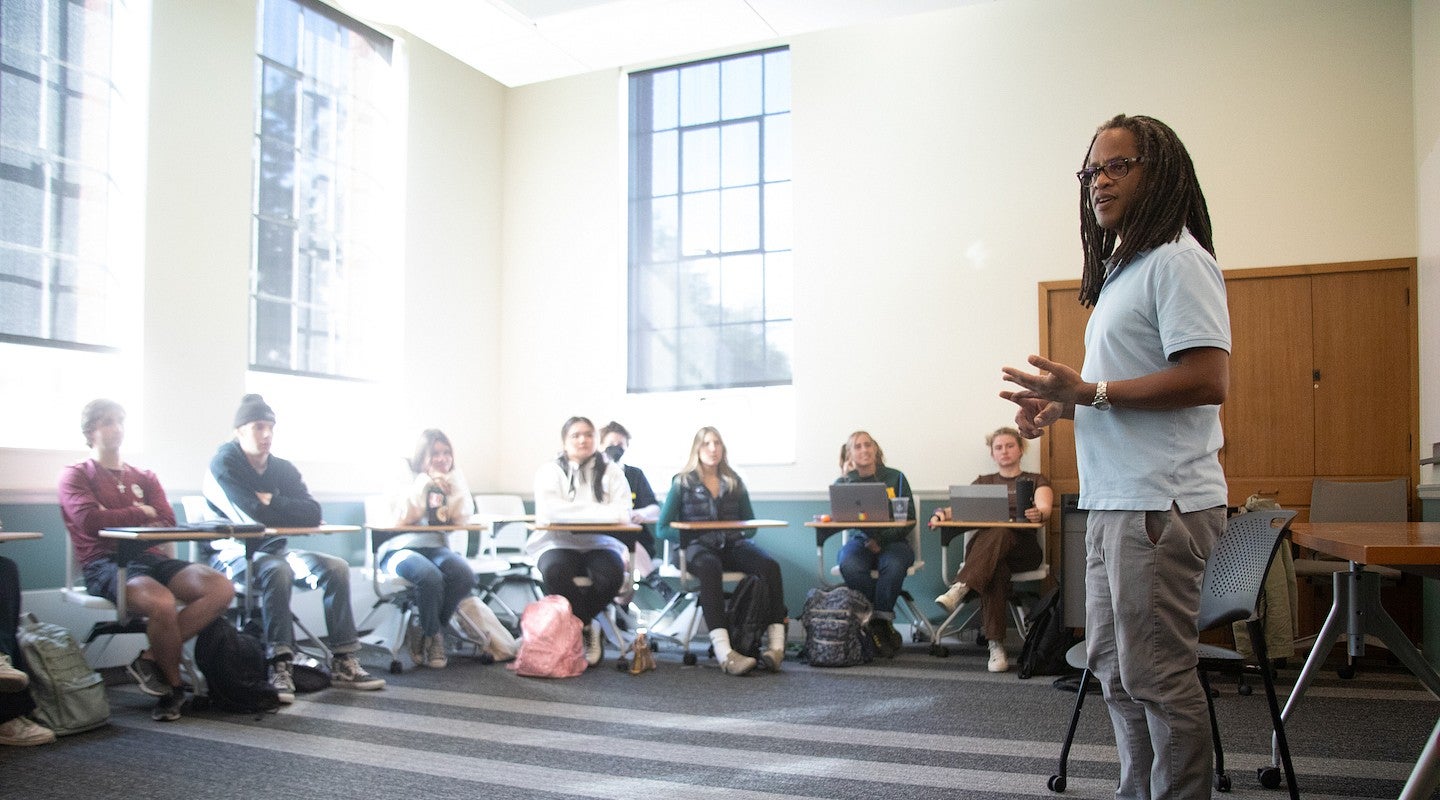
Unpacking narratives of revenge, darkness and chaos
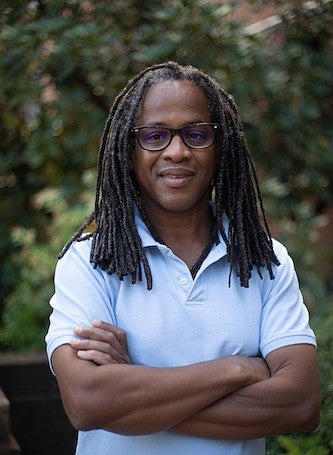
Favorite novel: "Nightwood" by Djuna Barnes
Go-to restaurant in Eugene: Chao Praya
Advice for students: Time is fleeting. Use it wisely.
Favorite place you've lived: Toronto
If you could have a conversation with any author, living or dead, who would it be: Cornell Woolrich
On a muggy Eugene summer afternoon, Ulrick Casimir looks lost in thought as he describes the satisfaction of helping students get comfortable with challenging material. With his love of teaching and storytelling written all over his face, you would think he was born an educator. But this wasn’t always his plan.
“It would have surprised my younger self,” Casimir says. When he began his undergraduate degree, he wasn’t sure he wanted to pursue his passion for storytelling.
That changed when he flourished in a poetry workshop during his junior year of college. The feedback he gave his classmates had them forming a longer line for his help than their professors. He remembers thinking at the time: “I think I just figured out what I’m supposed to be doing.”
At the University of Oregon, Casimir — Casimir – known as Dr. C. — has taught for years in the English and Cinema Studies departments. This fall, he joined the ranks of the Clark Honors College core faculty. He had been affiliated with the Honors College since 2014, teaching some classes here and there.
With a background in fiction writing, Caribbean studies, film studies and English, Casimir has led classes on cinematic noir, retribution and revenge, and the literary histories of terror and fear at the Honors College. Exuding calmness and confidence in his teaching, you wouldn’t guess he had to conquer his fear of public speaking and sweat through more than a few pages of notes to get where he is today.
A family of storytellers and teachers
Casimir spent much of his youth on a military base in Fort Liberty, North Carolina, after his family moved from Dominica in the Caribbean when he was seven. Surrounded by a family of storytellers and spending most of his free hours at the base’s library, his talent for writing developed naturally.
He remembers the many days that he watched his father “regale friends with his stories.” An insatiable reader, Casimir first “got the storytelling bug” after reading "The Great Gatsby" and thinking to himself: “I could do that.”
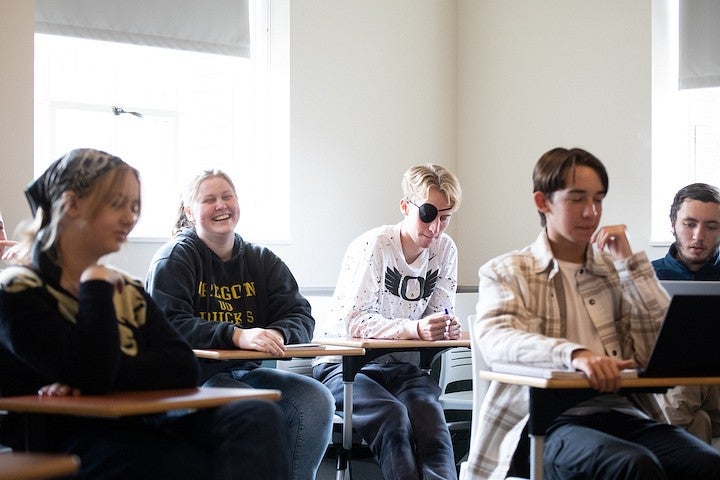
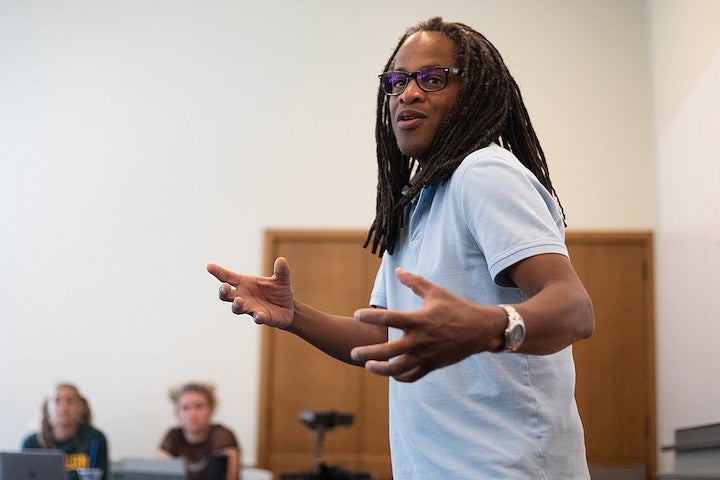
Casimir doesn’t shy away from intrigue, murder and revenge in his classroom. Instead, he wants his students to consider storytelling that grabs you by the throat.
“I was scaring my parents by getting into Stephen King novels,” Casimir says. “I read them like they were the Bible.”
With each story, he saw new possibilities for his writing. He wrote almost compulsively in his youth. It was an empowering outlet for creativity and processing life. But if you asked him back then if he would turn that passion into a career, he would’ve laughed.
Casimir’s mother, and hero, taught in Dominica. She homeschooled him and his siblings for a year after they lived through a hurricane that partly prompted their move to North Carolina. His grandmother taught, too. Widely respected, she ran a small school in the island nation. “She was an amazing teacher,” Casimir says. “I was one of her least well behaved but, she would probably say, her best students.”
She fostered his gifts early on. By the time he got to school in the U.S., he was two years ahead. Though his mother and grandmother were his biggest role models, he was too busy writing plays and short stories to imagine turning his gift into a career like theirs.
Honing a talent for writing
Eager to make his family proud, Casimir left high school thinking “you’re either going to be a doctor or lawyer.” He was on the path to law school until the storytelling bug pulled him back. Halfway through college, the poetry workshop he had taken for fun reminded him that he not only had a talent for writing — he had one for teaching.
Classmates and professors encouraged him. He tried a variety of writing classes, testing out poetry before sticking with fiction. “Writing is work,” he says, “but it doesn’t really feel like it. It feels like what I have to do. Sometimes, what I have to do is going to be hard.”
He finished his undergraduate degree at North Carolina State-Raleigh with a bachelor’s in English and a minor in communications. After that, he got into University of North Carolina-Greensboro and received his master’s of fine arts in creative writing and fiction.
At Greensboro, Casimir’s mentors helped him see writing in a new light. “They not only took me seriously, they got me to take my work seriously,” he says.
Lee Zacharias, one of his professors, says that Casimir’s aptitude for teaching shone clearly even then. He “brought that honest perspective,” Zacharias recalls, “to his reading of other students’ fiction, “and they benefited from it, at the same time that he was open to my and their perspectives on his fiction.”
When Casimir was a teaching intern in Zacharias’ undergraduate introduction to literature course, she says he reopened students’ eyes to what they missed in high school literature, helping them enjoy reading again.
It wasn’t necessarily easy at first, though. Public speaking terrified Casimir. “I love the job enough to put up with it,” he laughs as he recalls sweating out his first day of teaching.
'The Prince of Darkness'
After finishing his first graduate degree at Greensboro, Casimir taught a variety of English courses at Fayetteville Technical Community College and Methodist College. He came to UO for a second master’s and a PhD in English in 2001, focusing on film studies and Caribbean studies. He honed his instructional abilities in the classroom, teaching introductory writing and English classes.
Casimir’s parents, who worked hard to gain citizen status and support their family once they moved to the U.S., always wanted him and his four siblings to go to college. He says they didn’t care so much what it was in, they were just glad to see him go. But they were especially happy when he got his PhD and started teaching.
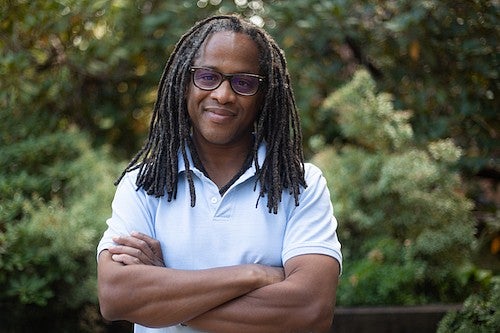
Casimir loves the creative freedom and community that comes with teaching in the CHC. Gravitating toward darker themes both in his writing and in course topics, he says he’s “heard at least one student refer to me as a prince of darkness before.”
His first collection of short stories, “Children of the Night,” was published by Corpus Callosum Press in 2018. Genre-transcending, grim, and hopeful all in one, it showcases his rich writing.
After settling into his position as part of the CHC core faculty, Casimir says he’s excited to develop new courses. He hopes to impart perseverance on his students. “I’m more concerned with personal development and growth from students,” he says, than innate talent. “What keeps me going is the students trying really, really hard. They make my heart sing.”
He says he looks forward to the moment when students “realize that something that was impossible for them to approach before starts to feel like breathing air.”
